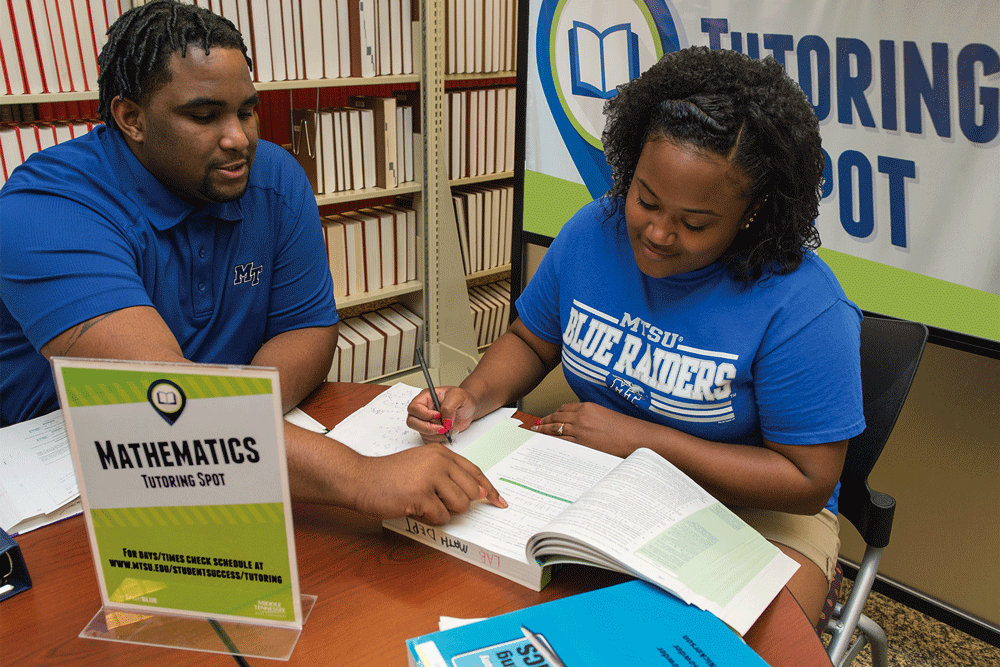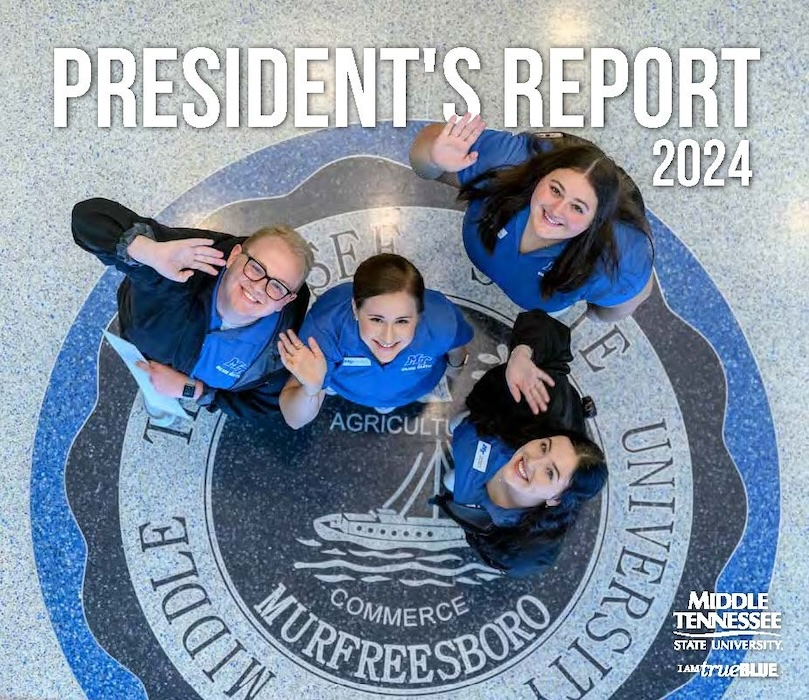Student Success
Filed Under: President's Post, President's Newsletters, Featured Articles
In recent years, MTSU’s focus has been squarely on student success—meaning helping students overcome obstacles, stay enrolled in classes, and earn college degrees. Those goals are in perfect alignment with the state’s formula for funding that emphasizes graduation over sheer enrollment and with Gov. Bill Haslam’s Drive for 55 initiative aimed at increasing the number of Tennesseans with degrees to 55 percent.
In 2013, I announced a major initiative—the MTSU Quest for Student Success—designed to ensure that every student who comes to MTSU with the drive to achieve would be met with the best instruction from excellent professors who care about their success. As part of the Quest, University faculty and staff members provide extra support and assistance when our students encounter unexpected difficulties or when roadblocks arise that negatively affect their persistence toward graduation.
The data bears out that we are excelling in the areas of retention and graduation in the past few years. Here are eleven fresh updates on our student success efforts.
1 REBOUND, our homegrown intervention for freshman students who achieved below a 2.0 grade point average their first semester, received a Models of Excellence award from a national organization (University Business). The program was also exclusively featured in an article published by Academic Impressions, a leading news source for higher education, with a subscriber base of 60,000.
2 The Scholars Academy continues its history of outstanding successes in serving at-risk students. The program has grown from an initial 30 students to 113 in 2014 and then 168 in 2015. In fall 2016, we are on track to enroll at least 350 students. A total of 85 percent of the students that started in the fall 2014 cohort were retained to fall 2015. This compares to an overall freshmen retention rate of 73 percent.

3 Free tutoring was offered for 187 courses for fall 2015, representing 24 disciplines. In this past semester alone, students spent 7,089 hours in tutoring! A recent internal study shows: Students that received tutoring were retained at 14 percentage points higher (77.78 percent) than those in the comparative group that did not receive tutoring (63.89 percent); juniors that received tutoring were retained at 100 percent, which is 41 percentage points higher than those in the comparative group who did not and retained at 58.93 percent; and the 79.17 percent retention rate for sophomores that received tutoring was nearly 10 percentage points higher than those that received no tutoring and had a retention rate of 69.79 percent.
4 Through the work of faculty and staff from across campus, a total of 30 Raider Learning Communities were offered for fall 2015. A careful assessment was made of RLC outcomes by the Office of Institutional Effectiveness, Policy and Research. Among the findings, there was a 3.3 percentage increase in persistence for RLC participants as compared to non-participants.
5 We continue to make great progress in improving success rates for new freshmen. In fall 2013, freshman retention was 68.2 percent. In fall 2014, the freshmen retention rate increased to 70.2 percentage. And, in fall 2015, MTSU’s retention rate for new freshmen, 73.2 percent, reached the highest level in at least the past 15 years. The improvement in freshman retention between fall 2014 and fall 2015, 3.0 percentage points, was the largest one-year increase observed at MTSU in at least the past 15 years.
6 In October 2015, MTSU was presented with the Data Driven Impact Award by the Education Advisory Board, a consulting group specializing in student success. MTSU was one of three universities to receive an award. In MTSU’s case, the award was in recognition of the University’s use of data to inform decisions that improve the success of students. Considerable progress continues to be made in implementing and applying technology to support our emphasis on advising. In October 2014, MTSU launched the EAB SSC predictive analytics system. Soon thereafter, MTSU became recognized as a national leader in utilization of the system. On March 10, 2016, the advising platform was significantly upgraded to SSC Campus. Advisors quickly began applying new features in the system to serve all students, but especially at-risk students. Many faculty have been introduced to the system, with a goal to ensure that all faculty have access and understand basic features by the close of the 2016–17 academic year. In August 2016, phase II of the system will be implemented, which places all advisors and students on a common scheduling system. And work is underway for launch of phase III of the system in January 2017, when tutoring will become an integrated part of the platform.
7 MTSU continues to receive national attention for its student success efforts. In recent weeks and months, articles about MTSU’s Quest for Student Success have appeared in USA Today, EDUCAUSE, Inside Higher Education, Academic Impressions, Education Dive, NerdWallet, and eCampus News.
8 Because of student success accomplishments, MTSU representatives have been invited to present at or participate in professional conferences, including SXSWedu, Austin, Texas, March 2016; iPASS2 at the Bill and Melinda Gates Foundation, Seattle, June 2016; ACT Enrollment Planners Conference, Chicago, July 2016; at the invitation of the Lumina Foundation, Indianapolis, December 2015; as a panelist at EDUCAUSE, sponsored by the Gates Foundation, Indianapolis, October 2015; and at the invitation of the Gates Foundation, Seattle, September 2015.
9 MTSU has been selected as one of five institutions to be profiled by Association of Public and Land-grant Universities (APLU) for best practices in implementing student success programs. A film producer and crew spent two days on the MTSU campus in April 2016 interviewing more than a dozen administrators, faculty, and staff for the project. In another project, APLU also selected MTSU as one of a select number of institutions to be featured as a National Case Study for Effective Use of Data to Improve Student Outcomes.
10 In the past six months,MTSU has been visited by representatives from six colleges and universities interested in best practices in implementing student success programs.
11 Through the work of faculty and other University leaders, a total of 21 sections of Supplemental Instruction (SI) courses will be piloted in fall 2016. Supplemental Instruction is a leading educational best practice that provides students with additional support, typically in courses where many students experience difficulties.



